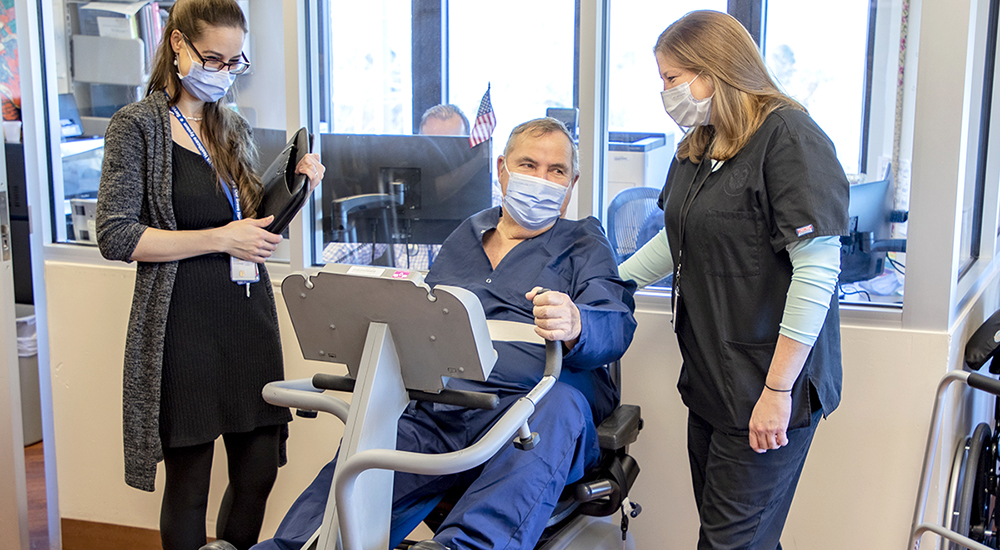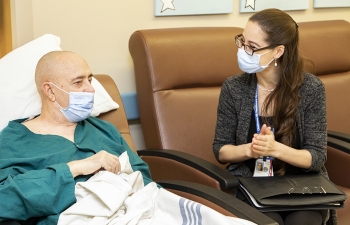Social workers play an important role in VA health care by providing support to Veterans, families and caregivers. You will find them in many service areas ready to help with anything from managing stress-related issues to assisting with finances, housing and questions about treatment.
Katherine Radick is a social worker at the Jack C. Montgomery VA where she works with Veterans in the Inpatient Physical Medicine and Rehabilitation Unit. As part of the team, she interacts with Veterans of all ages and backgrounds seeking to improve their mobility and strength.
On a typical day you might find Radick speaking with Veterans about their care, goals, values and support systems. She also assists with discharge planning and helps families find additional resources and services.
Radick served in the Army before becoming a social worker and can relate to many of the Veterans who come through the unit.
Service injury perspective helps her understand Veterans
“I went through rehabilitation after a service injury,” said Radick, while making her rounds in the unit. “Having that personal perspective helps me understand some of the experiences our Veterans are going through in being away from their families. I try to help them keep their motivation to strengthen and heal.”
Air Force Veteran Ross Burkepile greeted Radick as she approached him. Even under the mask you could see a big smile spread across his face when he saw her. After talking to Radick about his care, Burkepile expressed how grateful he was for her and the entire staff in the Inpatient Rehab Unit.
“My experience here has been exceptional,” said Burkepile. “In a short amount of time, they have turned my whole life around. I didn’t think I was going to make it when I arrived but, with their help, I am now walking and talking again. It’s amazing,” he said, pausing to wipe away tears. “Every single person I have met here has been extremely happy. It’s like the whole place is just energized with a positive energy. I couldn’t have prayed for a better group of people.”
Continuing her rounds, Radick greeted Army Veteran Jerry Tollison, who was busy working with his physical therapist, Katie Watson. Tollison greeted Radick with a big smile and a joke. While speaking with her and Watson, he complimented the rehab staff for the care he was receiving.
Radick says she enjoys having the opportunity to meet and support so many fellow Veterans. However, she was quick to point out that it’s a group effort.
“The inpatient rehab team and I do everything we can to be the cheerleaders and providers for our valued Veterans. We strive to work as a unit and discuss progress, as well as any areas that need improvement,” said Radick. “As the social worker, I bring to the table the voice of the Veteran and family, advocating for their values, goals and needs. This is my dream job, and it is truly rewarding.”
Topics in this story
More Stories
The Medical Foster Home program offers Veterans an alternative to nursing homes.
Watch the Under Secretary for Health and a panel of experts discuss VA Health Connect tele-emergency care.
The 2024 National Veteran Suicide Prevention Annual Report provides the foundation for VA’s suicide prevention programs and initiatives.








Nice story but this is far from reality of many veterans. I have not heard from my MH Counselor in over a year. My doctor has placed a note for her to call but to no avail. Previously, I had a condescending MH Counselor who would gossip about my business to a MSA who knew people that worked in my former organization. She would act very jealous of me when I would receive unwanted attention from my fellow male veterans. She would often go on about her husband, thus throwing it up my face that I lost my marriage due to the events from my service. Prior to that, I had a hateful counselor who did not have my best interest at heart.
VA social workers are the cheapest thing to acquire to claim they have mental health providers which is why the government hires them. They are uneducated, incompetent, and lazy. My thoughts and prayers to all the veterans that social workers have forced themselves on.